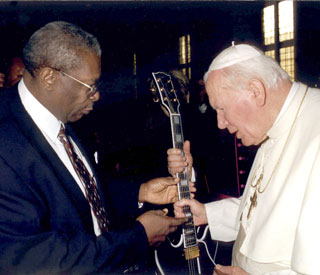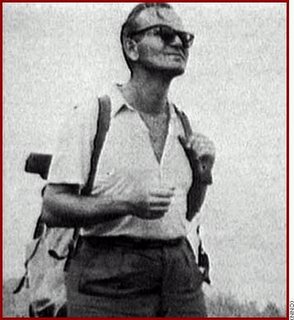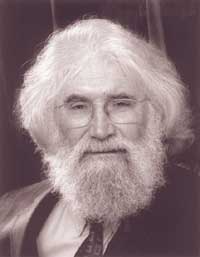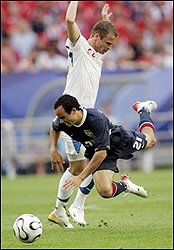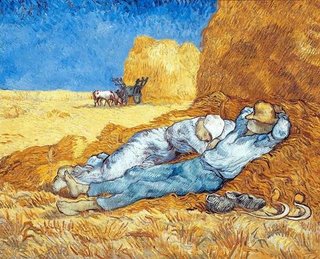 "The blind leading the blind", by Pieter Bruegel (the elder), 1568.
"The blind leading the blind", by Pieter Bruegel (the elder), 1568.As stated in my profile, polarization is on of my special concerns... not that I'm not guilty of fomenting some myself now and then...
One of the occasional correspondents here, "Mike McG", has sent me an excellent essay on polarization. As someone who spent two years off-and-on in the rough and tumble combat world of Catholic apologetics, I can testify to the fact that I have seen, been guilty of, or fallen victim to every single cliche, process, syndrome, and logical fallacy that Mike lists below. Of special resonance to me is the last one he lists, on "woundedness". Thanks for the great work, Mike.
A Pox on Both Their Houses:Why Content Matters so Little when Navigating in Polarized WatersThe Dominant Discourse in Polarized Public DebatePolarized public conversations can be described as conforming to a ‘dominant discourse,’…the most generally available and adopted way of discussing the issue in a public context. For example, the dominant discourse about the American Revolutionary War defined the war as one of colonial liberation. It is not usually described in the United States as a conspiracy of tax dodgers led by a multi-millionaire from Virginia.
Dominant discourses strongly influence which ideas, experiences, and observations are regarded as normal or eccentric, relevant or irrelevant. On a subject that has been hotly polarized for a long time, the dominant discourse often delineates the issue in a win-lose bi-polar way; it draws a line between two simple answers to a complex dilemma and induces people to take a stand on one side of that line or the other…Most people who care deeply about the issue yield to this induction.
Being aligned with one group offers benefits. It gives one a socially validated place to stand while speaking and it offers the unswerving support of like-minded people. It also exacts costs. It portrays opponents as a single-minded and malevolent gang. In the face of such frightening and unified adversaries, one’s own group must be unified, strong, and certain. To be loyal to that group, one must suppress many uncertainties, morally complicated personal experiences, inner value conflicts, and differences between oneself and one’s allies. Complexity and authenticity are sacrificed to the demands of presenting a unified front to the opponent. A dominant discourse of antagonism is self-perpetuating. Win-lose exchanges create losers who feel they must retaliate to regain lost respect, integrity, and security, and winners who fear to lose disputed territory won at great cost.
Carol Becker et al., From Stuck Debate to New Conversation on Controversial Issues: A Report from the Public Conversations Project.
www.publicconversations.org/ How Polarization Sells: The Growing Disconnect between Politics & Ordinary LifePolitics is increasingly a world unto itself, inhabited by people convinced of their own moral superiority: conspicuously, the religious right among Republicans; and upscale liberal elites among Democrats. Their agendas are hard to enact because they’re minority agendas. So politicians instinctively focus on delivering psychic benefits. Each side strives to make its political ‘base’ feel good about itself. People should be confirmed in their moral superiority.
Polarization and nastiness are not side effects. They are the game. You feel good about yourself because the other side is so fanatical, misguided, corrupt and dishonest. Because real differences between party programs have narrowed, remaining differences are exaggerated. Drab policy debates become sensational showdowns – one side or the other is ‘destroying’ the schools, the environment or the economy. Every investigation aims to expose the other side’s depravity: One side’s Whitewater becomes the other’s Halliburton.
Entertainment and politics merge, because both strive to satisfy psychic needs. Rush Limbaugh and Michael Moore are more powerful political figures than most senators, because they provide more moral reinforcement. Politicians, pundits and talking heads all heed the same logic: By appealing to their supporters’ strongest passions and prejudices, they elevate their standing. Of course, much of this is essential to legitimate debate. But it’s also a marketing strategy and a formula for power. Stridency sells, because, for many, polarization feels good.
Politics should reflect and, at its best, conciliate the nation’s differences. Increasingly, it does the opposite. It distorts, amplifies and inflames conflicts. It’s a turnoff to vast numbers of centrist voters who do not see the world in such uncompromising absolutes. This may be the real polarization: between the true believers on both sides and everyone else.
Robert J. Samuelson, The Washington Post,
Wednesday, June 30, 2004, p. A21. Tradition and Modernity in TensionBefore we can get a sense about the right claims being made by the traditionalist and modernist sides here, it is important to see what is wrong with both of them…To lean too much on a scriptural defense…or upon a continuous church tradition, could lead us to ignore or to downplay those situations in which we have in fact decided, not only as individuals but over time as a community, to ignore passages of scripture or areas of tradition that we do not accept the way our ancestors did.
At the same time, tradition is an important voice – or better, a harmony of voices, a consensus – that should make us critical of merely contemporary understandings. Its strength is that it is, as Chesterton said, ‘the democracy of the dead.’ To think that the common opinion of people whose perspective is blinkered by the zeitgeist of the late twentieth and early twenty-first centuries is wiser than the agreed wisdom of the previous two thousand years is, maybe, a little arrogant. Still, for many contemporary Christians, when traditional understanding meets the zeitgeist, the zeitgeist wins. It is assumed to be the correct, enlightened view.
John Garvey, Commonweal,
January 16, 2004.How Can the Sometimes Vicious, Sometimes Silly Culture Wars Be Calmed? Realize that all combatants are morally motivated. It seems to be part of the nature of moral argument that one’s opponents are seen to be motivated by evil….But such moralization and demonization obscure the true nature of the conflict and make moderation or compromise into a moral failing – one should not negotiate with the devil. It is more accurate, and certainly more conducive to cooperation, to acknowledge that both sides are driven by their moral commitments…The two sides differ in their conceptions of the good, not in the goodness of their motivations.”
Recognize that American morality is plastic and pluralistic. American morality has, from the very beginning, been woven out of two strands, which Bellah et al. (1985) call the republican and the biblical strands. It has always struggled to grant independence and autonomy to individuals within a society that believes strongly in Christianity and in some elements of Puritanism….If history is any guide, neither side can ever win the culture war and eliminate the other.”
Recognize that moral discourse is an ex post facto product. One of the most frustrating aspects of moral argument is that the other side is not swayed by one’s arguments, no matter how good they are. The failure to respond to reason makes the other side seem unreasonable, and invites charges that their ‘real’ motivations are hidden and sinister. But this inference is based on the naïve idea that moral reasoning drives moral judgment, so that one can change people’s minds by refuting their reasons. The present findings are more compatible with an intuitionist model of moral judgment in which moral judgments are based on gut feelings and emotional intuitions. People then create moral arguments by drawing on a priori moral theories, which they put forth as social products, required by the discourse of an argument (i.e., one must provide reasons for one’s judgments.) The refutation of such arguments does not cause people to change their minds; it only forces them to work harder to find replacement arguments.
Jonathan Haidt and Matthew Hersh, Journal of Applied Social Psychology,
2001, 31, 1, pp. 191-221.The Faults of OthersIt’s fun to laugh at a hypocrite, and recent years have given Americans a great deal to laugh at…Scandal is great entertainment because it allows people to feel contempt, a moral emotion that gives feelings of moral superiority while asking nothing in return. With contempt you don’t need to right the wrong (as with anger) or flee the scene (as with fear or disgust). And best of all, contempt is made to share…Tell an acquaintance a cynical story that ends with both of your smirking and shaking your heads and voila, you’ve got a bond.
Well, stop smirking. One of the most universal pieces of advice from across cultures and eras is that we are all hypocrites, and in our condemnation of others’ hypocrisy we only compound our own. Social psychologists have recently isolated the mechanisms that make us blind to the logs in our own eyes. The moral implications of these findings are disturbing; indeed, they challenge our greatest moral certainties. But the implications can be liberating, too, freeing you from destructive moralism and divisive self-righteousness.
Jonathan Haidt, The Happiness Hypothesis: Finding Modern Truth in Ancient Wisdom,
pp. 59-60.Do We Really Value Diversity? Arguments (for diversity) will be so much shadow-boxing – stalking-horses for the real arguments – because diversity is not a condition anyone actually desires.
What people desire is the alteration of a situation that displeases them; they regard it as an injustice that some group or population has been excluded from a benefit. They are not for diversity with a capital D – no one is. They are for the limited expansion of the franchise in the direction of their preferences.
In short, diversity – and I would say the same for its close relatives – openness, balance and inclusiveness – is a political rather than a substantive rallying cry. You call for diversity when your enemies dominate the playing field. You preach balance when the numbers are against you; you tout openness when you and your friends have been shut out.
Once the resonant phrases have had the desired effect and remade the world so it suits you just fine, the universalist vocabulary of diversity, balance and openness is discarded, only to be picked up by those who would deploy it in the service of an agenda you would never sign on to. Live by abstraction, die by abstraction.
Stanley Fish, Ph.D., New York Times,
December 29, 2002.A Collection of Clichés in TranslationAccountability: Your misdeeds are intentional and malevolent;
we’ll never forget…nor let
you forget…
your full responsibility for them.
Our mistakes are inadvertent and well intentioned, meriting full contextual understanding and a clean slate.
Dialogue: Conversations after
your full renunciation of ill-considered, narrow views and acquiescence to
our well-reasoned, authentic ones.
Extreme and Shrill: Your positions, as compared to
our positions which are
Moderate and Nuanced. Inclusivity from the perspective of the Left: The desire to cultivate people like
us plus those even more progressive.
Inclusivity from the perspective of the Right: The desire to cultivate people like
us plus those even more conservative.
Inconsistency: The perfect gotcha. No need to take
you seriously if
we can uncover any dissonance between views espoused then with views disclosed now.
Special Interests: Intense, influential zealots who advocate for
your interests.
We, on the other hand, never advocate for narrow self-interest, preferring instead to devote ourselves to the interests of the entire community.
Wedge Issues: Unfair and divisive issues raised by
your side to discredit
us. The issues
we raise, on the other hand, are fair game.
Random Thoughts on Sorting Process from ContentAmbivalence: The experience of finding compelling arguments on both sides of contentious issues, of regarding these issues as ‘close calls.’ Seems rare in public discourse, at least among participants with the greatest visibility and influence.
Binary: The tendency to categorize issues as bipolar, black and white. (Obviously
their problem since
we, of course, have open minds.)
Cognitive Dissonance: The discomfort felt at the discrepancy between what we already know or believe, and new information or interpretation. The repertoire for reducing dissonance is ample, but when not reduced dissonance can result in (gasp!) change.
Deconstruction: The practice of subjecting competing worldviews to debunking, harassment, sabotage, critique, contempt, caricature, and ridicule. Adroit deconstruction is often more effective…and certainly safer…than battling at the barricades!
Engagement with the Enemy: ‘Aiding and abetting’ ideological foes….especially when their arguments may be persuasive….is strictly forbidden. Never cede any ground! Any hint of conciliation only invites evisceration! Cast
their positions and motives in the worst possible light. Engage the least plausible of
their arguments and the least credible of
their spokespersons.
Energy Management: Holding dissonant views, especially publicly, is hard work and often exhausting. Circling the wagons conserves energy for other battles. True believers are pumped; both/and thinkers become depleted and estranged.
Exile: A condition shared by those who visibly resist the comfort of parochial loyalties. Painful! Even more painful than the alternative of
Silence.Intolerance of Ambiguity: The tendency to prefer rigid boundaries of thought and experience discomfort with messier, ‘grayer’ formulations. Recognized exclusively in others;
our positions are nuanced.
Myside Bias: The pervasive tendency to search for and evaluate evidence in a way that favors one’s initial beliefs.
Open-Mindedness: The willingness to search actively for evidence against one’s favored beliefs, plans, or goals, and to weigh such evidence fairly when available.
A corrective virtue. “What If:” A revealing, if exasperating, exercise in which
we imagine the implications of being fundamentally mistaken in
our presumptions or facts. What if
they have a point?
Nah!Woundedness: The allure of ideological realignment as a method for settling personal scores. Its premise: Repudiating the views of persons and institutions that have wounded us moves us closer to the truth.
But does it?If only there were evil people somewhere insidiously committing evil deeds and it were necessary only to separate them from the rest of us and destroy them. But the line dividing good and evil cuts through the heart of every human being. …Alexander Solzhenitsyn
I have this naïve notion that despair at the spectacle of absolute ludicrous quantities of mutual contempt on all sides breeds tolerance and mutual respect – due to laughter at the absurdity of it, or wariness at the endlessness of it. …random blog comment
